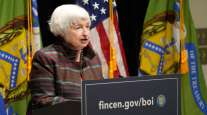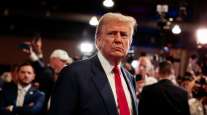Trump Makes It Clear as He Heads to Davos: America First, Period

On the eve of his trip to Switzerland to meet with world leaders and promote his “America First” agenda, President Donald Trump signed an order slapping tariffs on solar panel and washing machine imports.
His action, he said Jan. 23, “helps to create jobs in America for Americans.”
It also helps create a tough tone for the World Economic Forum this week in Davos, Switzerland. Trump and a large delegation of Cabinet members are set to depart on Jan. 24.
The gathering has typically attracted those who embrace a more globalist approach to economic policy, and Trump’s attendance on the heels of his decision is raising questions about how his presence will mesh with the event’s long-standing spirit.
RELATED: Trump swings into action on trade, adds edge to NAFTA talks
RELATED: Trucking industry concerned about NAFTA ending
“Protectionism is hardly the code word in Davos. It’s about international connection and recognition of the ways in which worlds are connected,” said Rep. Mark Sanford, (R-S.C.), who called both trade decisions “mistakes” which don’t reflect the nuances of the local economies that could suffer repercussions.
During a press briefing to preview the Davos trip Jan. 23, White House chief economic adviser Gary Cohn mentioned the two cases as an example of work that the administration is doing to protect U.S. companies and stop unfair trade practices.
He also pushed back against questions about why the president was attending the event, given the views reflected in the decisions.
“It’s America first, not alone,” Cohn said of Trump’s trade philosophy. “The president is going to Davos to speak to world leaders about investing in the United States. Moving businesses to the United States. Hiring American workers. Changing the direction of our economy to be one of the biggest and best and most efficient economies in the world.”
Brian Darling, who worked at the conservative Heritage Foundation and for Sen. Rand Paul, (R-Ky.), before founding Liberty Government Affairs, praised the president’s move as he heads for Davos as sending a clear, consistent signal the administration is going to “punish nations that are not treating our goods fairly.”
It will certainly spur discussion at Davos, Darling predicted, plus move the issue higher up on the agenda — a good thing when Trump is looking for leverage to renegotiate major trade deals such as the North American Free Trade Agreement between the United States, Canada and Mexico.
“This is a shot across the bow on NAFTA,” said Darling.
Sen. Sherrod Brown, (D-Ohio), whose home state would stand to benefit from tariffs on washing machine imports, agreed in a statement the decision would “show anyone who tries to cheat our trade laws that they won’t get away with it.”
But lawmakers who are particularly incensed by the solar panel decision predict Trump will emerge from Davos looking foolish for his actions.
Sen. Martin Heinrich, (D-N.M.), who testified against imported solar panel sanctions before the International Trade Commission late last year, called the tariffs an “unmitigated disaster of the president’s own making.”
He said the move would show the international community that thanks to Trump the United States has “somebody in the driver’s seat who is not thinking about macroeconomics.”
“The president clearly doesn’t understand that a lot of what he’s talking about is actually going to hurt a lot of folks in the United States,” said Sen. Chris Van Hollen, (D-Md.) “He’s trying to make a statement before going to Davos. … He may think that that’s symbolically important, but here in the United States it’s actually hurting American workers.”
Both of Trump’s trade decisions — announced Jan. 22 and put into Jan. 23 — have been characterized by the White House as designed to protect American jobs.
Solar industry officials have argued that if tariffs are imposed on imported panels, it will become cost prohibitive for domestic solar panel installers and owners of solar farms to buy the products they need to make their businesses viable.
“It’s ill-advised,” said Republican Sen. Richard Burr of North Carolina, one of several states where the solar power industry is booming.
The decision to place tariffs on large residential washing machine imports was geared towards punishing Samsung and LG, both headquartered in South Korea, for allegedly edging out domestic competitor Whirlpool, which has a plant in Ohio.
“It will provide a strong incentive for LG and Samsung to follow through on their recent promises to build major manufacturing plants for washing machines right here in the United States,” Trump said Tuesday.
Yet both home appliance companies have recently opened American plants, already making good on the pledge to start making washing machines domestically. Samsung’s Newberry, S.C., plant has opened for business and hired more than 600 people with plans to employ as many as 1,000 by 2020. Samsung has warned South Carolina officials that tariffs could have a chilling effect on its ability to expand in the state.
Sen. Lindsey Graham, (R-S.C.), gave credit to fellow South Carolina Republican Sen. Tim Scott for leading congressional efforts to protect the state from an adverse decision. Scott’s office said in a statement the lawmaker was evaluating “legislative options” in response.
As for the message it would send in Davos, Graham said, “I’ll let (Trump) worry about the message. I’m worried about the jobs in South Carolina.”
Distributed by Tribune Content Agency, LLC




